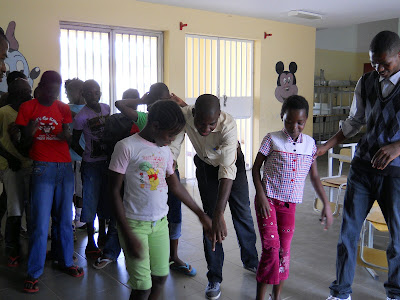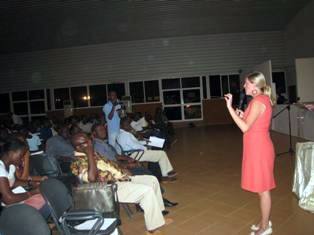* My parents still continue to generously support
Baphumelele Children’s Home, which is run by CHOSA Children of South Africa

Shortly after I arrived in
Luanda, my friend Melissa, who is the Community Liaison Officer at the Embassy,
told me about an opportunity to volunteer at a local orphanage. I jumped at the
chance.
Lar Kuzola, which means “love” in
Kimbundu, a local language, is in the heart of Luanda. The children, who range from infants
to teenagers, have arrived at Lar Kuzola for a number of reasons. Some have
been abused, abandonded, or neglected by their families. Others have lost their
parents to disease or violence, while others have severe mental or physical
disabilities that their families could not cope with. Perhaps the most
distrurbing reason why some children end up there is witchcraft. Witchcraft is
still a very prominent aspect of Angolan culture, even in urban areas. Many
times, children are accused of being witches if the parents are experiencing
hardship. They will go to a “priest” and ask why such terrible things are
happening to them, and the “priest” will blame it on their child who he claims to
be possessed.
Warning: this article may cause you to lose all hope for humanity
 Unfortunately, my first visit to Lar Kuzola, was nothing like
my experience at Baphumelele. Due to
lack of funding and volunteers, the facility, which is home to about 250
children, is severely understaffed. It’s somewhat of a free-for-all in which
the children roam about doing their own thing, without supervision or
structure. Anyway, I met with the director, who asked me if I would like to get
involved with a pilot English program for 15 children. Since I am pretty busy
these days, I was thinking I really don’t have time to teach myself, but I
could ask some of my English students at the university if they would be
interested. Voila! The idea for the Lar Kuzola Student-Teaching Program was
born.
Unfortunately, my first visit to Lar Kuzola, was nothing like
my experience at Baphumelele. Due to
lack of funding and volunteers, the facility, which is home to about 250
children, is severely understaffed. It’s somewhat of a free-for-all in which
the children roam about doing their own thing, without supervision or
structure. Anyway, I met with the director, who asked me if I would like to get
involved with a pilot English program for 15 children. Since I am pretty busy
these days, I was thinking I really don’t have time to teach myself, but I
could ask some of my English students at the university if they would be
interested. Voila! The idea for the Lar Kuzola Student-Teaching Program was
born.
Since many of my students at Agonstino Neto University are
aspiring teachers, I thought this would be a great opportunity for them to get
some hand-on experience while at the same time providing the kids at the
orphanage with English lessons. Everybody wins!
The response from my students, who are now the
student-teachers, has been amazing! I have been really impressed with their
dedication. We have been holding the classes on Saturday mornings for the
last few weeks and I hope that this will continue indefinitely, even after I
leave in December.
Best of all, when I am in that classroom, I get that
old feeling back again. The way I felt at Baphumelele. And I can tell that the
student-teachers feel it too.
 |
| Ball toss - always a crowd pleaser |









